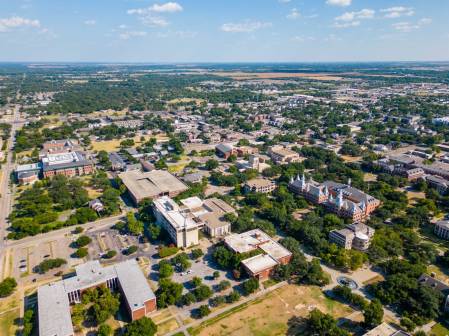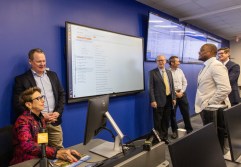Regent University opens stand-alone cyber range

Regent University debuted its new, state-of-the-art cyber range Tuesday, joining a short list of colleges and universities that host a stand-alone cybersecurity training facility — and an even shorter list of private institutions.
The multimillion-dollar range is now part of Regent’s Institute for Cybersecurity, which is nestled on the campus in Virginia Beach, Virginia, but also serves industry officials in finance, healthcare, military and education.
The Regent Cyber Range, built with Cyberbit technology, delivers hands-on training and cybersecurity simulations “as close to the real attack as you can get,” said Gerson Moreno-Riaño, executive vice president for academic affairs at Regent, who played a significant role in executing the construction and opening of the range.
“It’s just like being in a true security operation,” Stephen Thomas, general manager of Cyberbit North America, told EdScoop.
The 3,000-square-foot range can accommodate 20 people, or four teams of five individuals. During training simulations, each member of a team is assigned a different role — one person may be responsible for security information and management, another assigned to monitoring event logs, another operating the firewall and someone else investigating malware activity at the endpoint level.
“Then, as you initiate the scenario, you’re truly operating in a real-world network,” Thomas said. The range generates an attack, and each team works together to block the attack and protect their network against it.
“These are very complicated attacks. It requires the entire team’s effort,” Moreno-Riaño said.
If there is a breakdown in the defense, or one step takes too long, teams get a chance to debrief and address these mistakes. “Exposing those inconsistencies” makes cybersecurity professionals more agile and propels them from being competent in their fields to being experts, Thomas said.
After all, the purpose of the range is to create the most realistic cyberattack scenarios possible so those who work through them are equipped to manage the real thing, Moreno-Riaño said.
“Every week there’s something happening,” said Moreno-Riaño, alluding to recent cyberattacks like the breach at Equifax, in an interview with EdScoop. “This [range] is critical for national security, national defense, homeland security, economic security. We want to be able to contribute to that by preparing the best of the best.”
Regent University and Cyberbit have each developed attack scenarios that will be used in the cyber range. They will continue to add new and enhanced scenarios to the facility as cyberthreats evolve and become even more sophisticated.
The range will primarily be used to train cybersecurity professionals, including C-level executives and other industry officials, but about 25 percent of the training provided will support undergraduate and graduate programs at Regent, hopefully encouraging those students to pursue careers in the field.
“We want to make sure we contribute in a significant way to minimizing the gap in the workforce, the tremendous gap in cybersecurity positions filled,” Moreno-Riaño said.
The demand for skilled cybersecurity workers continues to outpace the supply. Industry reports estimate that the global shortage of cybersecurity professional will reach 1.5 million by 2019.
“The skills gap is real, and it’s significant,” Thomas said.
It’s very likely, Thomas said, that recent breaches would have been contained and managed more easily if companies had access to better-trained — and more — cybersecurity professionals.
Cyberbit also recently worked with the state of Maryland to build a cyber range in Baltimore. That facility opened in August.
“Through consistent training and upscaling of your own talent, I think in many ways people will identify and be able to better avoid breaches like the ones we’ve seen,” Thomas said.




